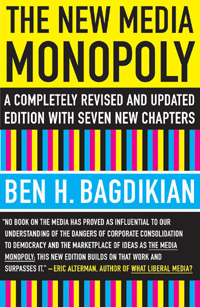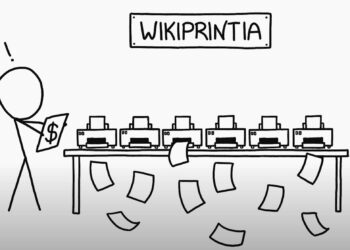
In 1983 Ben Bagdikian wrote “The Media Monopoly,” whose argument is that the wave of mergers and acquisitions in the media world was putting access to the world’s news and information into the hands of a small number of gatekeepers. These gatekeepers were huge media companies (Gannett in newspapers, Time Warner in magazines and movies, and so forth), whose declared objective was to deliver profits for shareholders, not raise the level of discourse for the society at large–even though many of the people who work for these organizations are hard-working and highly principled.
This is a good book and I recommend it even now (it has gone through several editions and is still used in undergraduate journalism courses), though its argument increasingly looks quaint. Today’s gatekeepers are no longer the big media companies (defined as organizations that invest in and distribute content: books, magazines, television, journals, movies) but the huge technology companies that have learned how to profit from others’ content: Amazon, Google, Apple, Facebook. Unlike the gatekeepers of old, however, who were characterized by editorial decision-making, the new gatekeepers control access through an abstract network of relationships, some of which qualify as what economists call “network effects,” in which the value of a product or service increases as more people use it. A rose by any other name . . . is still a gatekeeper.
These thoughts are prompted by the recent drubbing Apple took at the hands of our ever-vigilant Department of Justice. Apple was convicted of colluding with 5 book publishers to raise prices for ebooks, a conspiracy that targeted the aggressive discounting by Amazon at the expense of consumers.
Before going any further, I want to express my view of the matter directly: whatever Amazon’s growing influence, collusion is collusion, and violating anti-trust law is not the way to expand the diversity of channels for news and information. Some people who were siding with Apple in this matter point to Amazon’s dominant position and stop there, as though the ends justify the means. It may be ridiculous to talk about book publishers having any power in the marketplace as it is constituted today, but powerless though they are, they should not collude.
If we were once concerned about the power of Gannett (who?), what are we to make of Amazon, which, depending on who’s counting, now has around 60% of the domestic ebooks market and between 20-30% of the print book market? When you get outside the trade publishing segment, those numbers move around. For some university presses Amazon’s share is around 50% of all books sold. Ebooks today are about 25% of all trade books sold, a number that reaches 60% for such segments as young adult fiction. Academic books today are still largely a print business (90%), but that is changing rapidly. As more and more books are consumed in digital form, Amazon’s overall market share for books will continue to rise.
How did Amazon get so big and powerful? A personal anecdote to help understand this phenomenally successful company. Recently I awoke in the middle of the night and couldn’t fall back to sleep. Rather than lie there until dawn, I picked up my iPad and went to the Amazon Kindle site. After browsing the store for a few minutes, I selected a novel a friend had recently recommended to me. Using Amazon’s patented “1-click” ordering system, I purchased the book and began to read it. I fell asleep about an hour later.
How good is Amazon? Unbelievably good. Like a few other tech companies, Google in particular, what they do verges on magic. Amazon was able to serve me as a customer in minutes while I was lying in bed in the middle of the night. The number of things that Amazon does brilliantly is simply astounding, and many of these things did not exist before Amazon invented them. Whoever thought that we would routinely give out our credit card information online or that we would look forward to coming home to see an Amazon carton on the front stoop? Amazon got big and powerful because they are very, very good at what they do.
Amazon is not a gatekeeper in the sense of someone who says yes or no to something. Although Amazon has a small publishing operation, the company’s instincts are not editorial. And here is the core problem: we have a vocabulary to talk about access to information that stems from the print era. This is an aspect of what I call the Editorial Fallacy, the idea that the key business decisions for a publishing or media company are based on editorial selection. Editors once did indeed rule the roost (“content is king”), but now the leaders are technologists who think like economists.
Amazon is not a gatekeeper who tries to keep me out; Amazon is more of a concierge that wants to keep bringing me in–over and over again at the hidden expense of silently dissuading me from going elsewhere. And so I have an Amazon account where I can see all the books in my personal library. Nothing to stop me from buying a book from the Apple iBookstore or Barnes & Noble’s online store, of course, but then I would not have all my books in one place. If I subscribe to Amazon’s loyalty program Amazon Prime in order to get streaming videos, I then discover I get free shipping on print books. Nothing to stop me from buying a book at my local independent bookstore, but with free shipping, why wouldn’t I simply shop at Amazon? If I go online to find out something about a book I soon discover that Amazon’s book descriptions are typically the best to be found anywhere. Now I have decided to purchase the book and there is nothing to stop me from purchasing it anywhere. But with Amazon, one-click ordering is on the same page as the book description, so why not do it the easy way, why not simply order it from Amazon?
These features and the lock-in they provide are not simply an accidental byproduct of Amazon’s outstanding customer service but are an essential component of Amazon’s strategy. Take, for example, some of Amazon’s B2B tricks. A publisher that is having a dispute with Amazon about one thing or another may find itself punished by Amazon, which removes the “buy” button for the publisher’s books. Think about that. You are a consumer, who begins a book search on Google. Google provides you to a link to the Amazon site, but when you get there, you see a description of the book, but no way to purchase it. I call this bait-and-switch (DOJ, are you listening at last?), a kind of consumer fraud. The book publisher, however, understands that it is necessary to do business with Amazon and on Amazon’s terms; thus they are forced to capitulate.
Or Amazon promotes a program for self-published authors, offering to pay a high royalty. The catch is that if Amazon finds the books available for a lower price anywhere else, Amazon has the right to lower the price of the book (and the royalty that comes with it); theoretically the price and royalty could drop to zero. This means that the self-publishing author cannot in fact (though she can in theory) make her work available on other sites because the prices can keep ratcheting downward. I call this restraint of trade (DOJ, are you still not listening?), but for many people it seems simply like a matter of personal choice. Amazon is a great company with a bad character, and bad character is not against the law.
I don’t support the notion that if you don’t like the way the marketplace is treating you, you should just lobby to change the law. And certainly many publishers would like nothing more than to have Amazon hobbled by a regulatory agency in order to serve their business interests. They do not have my sympathy. My concerns are twofold. The first is the same one that Bagdikian articulated long ago, and if anything the situation is more serious now than when that book was first published. But my other concern is that we are fighting new battles with old weapons. It is not access or biased editorial gatekeeping that are the problems today. The problem is a gentle lock-in, a tendency for users to support ongoing industry concentration without anybody invoking the dark threat of censorship.
So let’s chip in and send the DOJ a copy of a different book, “Information Rules,” which explains the business strategies of operating in an information economy. You can even buy it on Amazon.
Discussion
10 Thoughts on "The New Gatekeepers are Economists"
We buy our dogfood from Amazon so I do not see it as a technology company, but as a catolog company. Mail order just happens to be electronic. It would thus be interesting to compare Amazon’s market power with that of Sears between the World Wars, when most people lived on farms or in rural communities. Of course it is incredibly more flexible and complex today, like most things. Whatever it is it is indeed wonderful. But the power of the Web is such that new entrants should be able to compete in specific product lines. My wife is an Internet shopper and she never just goes to Amazon.
Lots of good insight here. Thanks.
BTW, that Amazon “Buy” button is a lie in and of itself. We really don’t buy an eBook from Amazon, we rent it and the terms of that lease are pretty vague but enforced by DRM that is illegal and inconvenient to circumvent. The importance of DRM to that “gentle lock-in” cannot be overstated.
As authors and publishers learn to live DRM-free (some, like O’Reilley and Tor already have), that particular Amazon bond will loosen.
Contrast Amazon with Google Books – some of the worst product descriptions and support services I have ever encountered. GB may offer discounts (that Amazon then follows), but it suggests collusion more than trust.
“Think about that. You are a consumer, who begins a book search on Google. Google provides you to a link to the Amazon site, but when you get there, you see a description of the book, but no way to purchase it.”
Perhaps Google should heavily penalize Amazon’s book page in their search algorithms when the buy button is not available. That would be a nice case of turning the knife back on the wielder.
What happens if and when scholarly book publishing moves to open access (in the manner that will be demonstrated by the new Amherst College Press)? Amazon will have no ebook to sell. It may still be a vehicle for sales of a POD edition, however. On the other hand, if Expresso Book Machines proliferate on college campuses, Amazon might be cut out of that business too. Libraries may begin to see this as a potential source for some income, charging a modest fee for use of the machines. Some are already servicing self-published authors in this way.
I initially wondered why Amazon would invite individual book vendors to compete with the company’s offerings. Very often, a vendor will sell in-print books for less, sometimes much less, than the same book costs buying directly from Amazon. I then came to the realization that Amazon wants to be the one-stop place to buy books. Enticing out-of-print vendors to sell through Amazon makes Amazon the place to go to find not only newer books, but books way down the long tail. I think that 12,000,000 is about the lowest popularity ranking I’ve seen though some books have no ranking since Amazon has never sold a copy.
Amazon, however, profits heavily from these sales. I’ve been a small out-of-print dealer myself since 2005 both as a hobby that might grow in retirement and as part of my research on the out-of-print market. The Amazon commission structure is brutal. Even with a $40 per month power seller membership, the commission on a $.01 book is $1.35. With the increases in postal rates, I don’t quite understand how those who sell at these low rates make any money. I have to price items around $2.25 to make a profit of $1.00 per sale. The minimum commission for those who sell only a few books is $2.35.
Ebay’s fixed price subsidiary, Half.com, has become almost irrelevant though I list most of my items on both sites. From being nearly equal in sales in 2009 with Amazon, I now sell around five books per month there. Part of the reason may be Ebay’s reported lack of interest in Half.com. I don’t have any experience with Abebooks, now an Amazon subsidiary.
In my course on collection development, I describe Amazon as wanting to take over the world and being willing to sacrifice profit for market share. On the other hand, a column in the Wall Street Journal this week believes the stock to be overpriced even with the the optimistic profit predictions for 2015.
Even with my concerns, Amazon packages arrive regularly at my house including one containing my vacuum cleaner. With one of the best guarantees in the business, shopping is about as risk free as it can get.
Another great article. I’ve always thought that the issue with amazon was a RETAIL one, and not editorial. Amazon found a way to offer consumers what they want when they want it at a cheaper price. Your piece sums it all up perfectly. Thanks for the read.
Left out of the discussion here in Amazon’s ability to sell books at such low cost is the fact that they have managed to purchase books at wholesaler prices, when in fact they are a retailer. Publishers made a deal with the devil and the long term cost will be less books (and maybe even less of everything). When developers, authors, publishers, manufacturers, etc can not make a decent margin on what tehy create, less will be created. Yes in the short term the Amazon model is innovative, in the long run it will stifle choices and helo destroy communities the way that malls and suburbs damaged the fabric of our cities.


